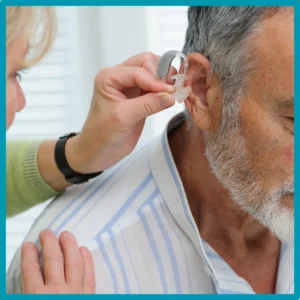5 Ways Untreated Hearing Loss Interferes with Relationships
Untreated hearing loss interferes with relationships in ways that many people don’t realize. It can create communication barriers, increase emotional distance, and lead to frustration for both partners. Over time, these challenges can weaken the bond between loved ones. If left unaddressed, hearing loss can turn simple conversations into stressful experiences. Understanding how untreated hearing loss affects relationships is the first step toward improving communication and restoring emotional connections. Addressing hearing loss early can prevent long-term emotional strain and help couples maintain a healthy connection.
Find out more about hidden hearing loss.
1. Communication Breakdowns Create Frustration
Hearing loss makes conversations difficult. You may miss words, ask for repetition, or misunderstand your partner. Over time, these issues lead to frustration. Your loved ones might feel ignored or unimportant. Effective communication builds strong relationships, but untreated hearing loss can weaken this foundation.
Misunderstandings can lead to unnecessary arguments and feelings of resentment. Repeatedly asking for clarification can make interactions tiring for both partners. Eventually, frustration may build, making communication feel like a burden instead of a natural, enjoyable part of the relationship. Small frustrations over time can lead to major conflicts. Addressing hearing loss early helps maintain clear and meaningful conversations. It also allows both partners to express themselves freely without the fear of miscommunication.
When communication breaks down, relationships often suffer. Conversations that were once effortless may become tense and stressful. Over time, this can create an emotional gap between partners. The inability to fully hear and respond to each other can lead to feelings of neglect and disconnection. Taking action by seeking hearing care can help bridge this gap and restore natural communication.

2. Emotional Distance and Loneliness Increase
Untreated hearing loss often causes feelings of isolation. When conversations become challenging, people may withdraw from social interactions. This leads to emotional loneliness, making it harder to connect with loved ones. Your partner may also feel disconnected, missing the spontaneous chats that strengthen relationships. Treating hearing loss allows for more engagement and emotional closeness.
Over time, loneliness can evolve into sadness or even depression. If one partner consistently feels unheard or struggles to share their thoughts, emotional bonds weaken. Spontaneous moments, like sharing a funny joke or exchanging endearing words, may disappear. Emotional intimacy requires consistent connection, and untreated hearing loss can slowly erode that bond. Seeking treatment ensures that both partners can share in each other’s daily lives without barriers.
Loneliness isn’t just about being physically alone—it’s about feeling disconnected from those around you. A partner with untreated hearing loss may begin to avoid long conversations, missing out on the deep discussions that build emotional closeness. Over time, both partners may feel a growing emotional distance, which can lead to frustration and sadness. Seeking hearing treatment can help restore emotional balance and maintain a strong bond between loved ones.
Understand the health risks of hearing loss.
3. Social Activities Become Stressful
Social gatherings can be overwhelming when hearing loss goes untreated. Background noise, multiple speakers, and fast-paced conversations make it difficult to keep up. As a result, you might avoid social events or struggle to participate. Your partner may feel torn between including you and enjoying the conversation. Treating hearing loss helps you stay involved and enjoy social interactions together.
Not participating in conversations can make you feel left out, even among close friends and family. You may find yourself nodding along, pretending to understand, while missing important details. Over time, this may lead to social withdrawal. Your partner may also feel frustrated if they must constantly translate or repeat conversations for you. Seeking treatment makes it easier to engage in social activities without stress or discomfort.
As social withdrawal increases, relationships can suffer. Partners who once enjoyed social outings together may begin staying home more often, missing out on shared experiences. Family gatherings and celebrations may feel overwhelming, leading to further isolation. Seeking hearing care can help bring back the joy of social interactions and allow both partners to enjoy shared moments once again.
Learn about how addressing hearing loss can improve health care.

4. Increased Stress and Tension in Relationships
Struggling to hear every conversation takes effort. You may feel exhausted from trying to piece together what others are saying. Your partner may feel stressed from constantly repeating themselves. This ongoing tension can lead to irritability and arguments. Addressing hearing loss reduces stress and makes daily communication easier for both you and your loved ones.
Stress in relationships can manifest in different ways. One partner may become short-tempered, while the other feels overwhelmed by their role as a constant interpreter. This emotional strain can lead to unnecessary conflicts. The added frustration may create distance in the relationship. Over time, even small interactions may become tense. By addressing hearing loss, couples can communicate more effortlessly and reduce relationship strain.
Constant communication struggles create an emotional toll on both partners. Simple tasks, like discussing dinner plans or coordinating schedules, may become stressful. Over time, this added tension can affect the overall happiness of a relationship. By addressing hearing loss with professional care, couples can reduce stress and restore harmony in their interactions.
5. Intimacy and Spontaneity Decline
Small, everyday conversations create intimacy. Jokes, whispered comments, and subtle expressions of love build closeness in relationships. When hearing loss interferes, these special moments fade. Miscommunications may replace shared laughter, and frustration may replace affection. By treating hearing loss, you can restore these meaningful moments and strengthen your relationship.
Lack of communication can diminish emotional and physical intimacy. Intimate moments often begin with a simple conversation, and when those moments become strained, couples may experience emotional distance. Romantic partners may feel disconnected when one cannot fully engage in casual, affectionate exchanges. Treating hearing loss allows both partners to rekindle the joy of effortless conversation and shared intimacy.
Relationships thrive on the ability to share moments—both big and small. Without the ability to hear and respond in real-time, these small but meaningful moments can slip away. Whether it’s laughing together over a private joke or simply discussing the details of your day, hearing loss can disrupt these intimate interactions. Seeking treatment can help bring back these lost connections and restore closeness.
Keep road trips safe with these tips on driving with hearing loss.

Strengthen Your Relationships with Better Hearing
Hearing loss doesn’t just affect you—it impacts your loved ones, too. If you’ve noticed communication struggles, emotional distance, or increased stress, it may be time to seek help. Relationships thrive on clear communication and mutual understanding. When hearing loss goes untreated, it creates barriers that can weaken even the strongest relationships.
The good news is that hearing loss is treatable. Seeking professional care can restore clarity in conversations, rebuild emotional bonds, and reduce stress in relationships. We offer comprehensive hearing care to improve your quality of life. Contact Stanford Hearing today to schedule a hearing evaluation and reconnect with the people who matter most. Don’t let untreated hearing loss interfere with your relationships—take action today and strengthen the connections that matter most.
